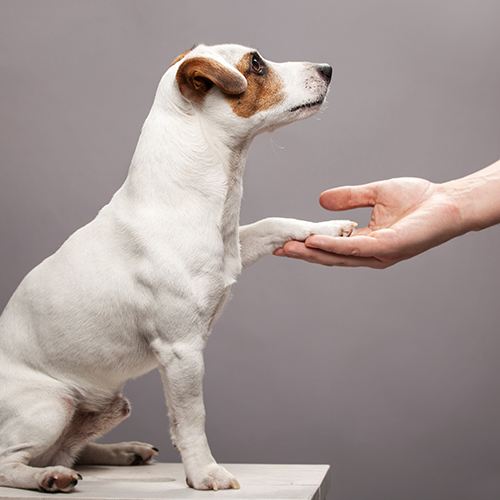Comfort dogs can be used to assist witnesses testifying in criminal trials, top state court rules

Image from Shutterstock.
Trial courts may allow comfort dogs for witnesses at criminal trials in appropriate circumstances, the Pennsylvania Supreme Court has ruled. The court on Wednesday affirmed the 2018 third-degree murder conviction of Sheron Jalen Purnell, ruling that the trial court did not abuse its discretion by allowing a comfort dog during the testimony of a minor with autism.
Law.com and the Chester Daily Voice have coverage.
The comfort dog, Melody, was a Labrador-golden retriever mix that had training for accompanying witnesses in court. The trial judge determined in advance that the dog would be hidden under the witness stand, although it was likely that jurors would be able to see the animal. The dog would enter and exit the courtroom outside the jury’s presence.
During the trial, the judge referred to Melody as a “service dog” to lessen any sympathy and told jurors that they should not assess the minor’s testimony any differently because of Melody’s presence.
Trial courts considering whether to use comfort dogs should use a balancing test, the state supreme court said in its Sept. 22 opinion.
“We hold that a trial court should balance the degree to which the accommodation will assist the witness in testifying in a truthful manner against any possible prejudice to the defendant’s right to a fair trial,” the court said.
The defense had argued that the dog prejudiced Purnell by suggesting that the witness was vulnerable and worthy of sympathy.
The Pennsylvania Supreme Court said court rules give trial judges reasonable control over witness examinations and procedures to determine the truth.
“We hold that this language is sufficiently comprehensive to allow a trial court to consider whether a comfort dog may assist a witness in testifying in a truthful manner during a trial,” the court said.
The state supreme court said it agreed with other states that a balancing test should be used when trial judges assess whether dogs should be used. It pointed to a Connecticut decision, which said the “pivotal question” is whether the dog will aid the witness in testifying truthfully and reliably.
“After careful consideration, we adopt this well-reasoned standard,” the Pennsylvania Supreme Court said.
In February, the policymaking ABA House of Delegates adopted a resolution urging the adoption of laws authorizing courts to allow specially trained comfort dogs.
The resolution said the dogs should be allowed to assist victims and vulnerable witnesses during any stage of the criminal justice system, including during their testimony in judicial proceedings.
A report accompanying the resolution said that, in the past five years, at least 15 states have passed laws permitting the use of dogs to accompany victims and witnesses in specific circumstances.
State laws vary. Some only allow specially trained dogs to help children in criminal matters or in abuse and neglect cases. Other statutes extend the accommodation to adults who are physically, mentally or developmentally disabled or to adult victims and witnesses in sexual or domestic assault cases.
In states where there is no specific statute, courts have relied on the trial judge’s inherent discretion to establish protocol, the report said.



